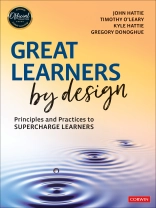Supercharge learners and learning
Today’s students need more than great teaching of the curricula; they must also be taught the love and strategies of learning. It’s time for a balanced approach that teaches students how to access and process information and inspires a desire for continuous learning.
Written by renowned researchers and educators, Great Learners by Design advocates moving away from rote learning and teacher-centric classrooms. Instead, it promotes cultivating self-sufficient, strategic, and visible learners through effective learning strategies. This approach helps foster a learning environment where mistakes are seen not as embarrassments but as opportunities for growth. Inside, you’ll discover
- New and traditional learning theories and how to implement them in the classroom
- 12 learning strategies and 13 learning principles that will transform your class and school into an organization dedicated to excellence
- How to use and integrate tools for measuring learning
With the goal of creating lifelong learners, Great Learners by Design offers an in-depth analysis of learning theories, practical classroom applications, and tools. It is a vital resource for enhancing students’ skills and encouraging them to use optimal strategies to succeed both in the classroom and beyond.
Table of Content
Chapter 1. The life of Brain/Brian
Chapter 2. A model of learning
Chapter 3. Identifying the top 12 learning strategies
Chapter 4. Improving the top 12 Surface-related learning strategies
Chapter 5. Improving the top 12 Deep-related learning strategies
Chapter 6. Measuring the top 12 learning strategies
Chapter 7. Creating schools as learning organizations
Chapter 8. The fundamental principles of learning
Chapter 9. The model of intentional alignment
About the author
Gregory Donoghue Ph.D has over 30 years of experience working with vulnerable children – as a former child abuse detective with Victoria Police and statutory child protection investigator, and currently as a researcher and lecturer in the science of human learning and student wellbeing. Greg completed his Ph D in educational neuroscience and combines his other qualifications in psychology, criminology, education and neuroscience to develop and deliver evidence-based learning interventions for children and adults with various learning difficulties, particularly those caused by trauma and mental health issues.












